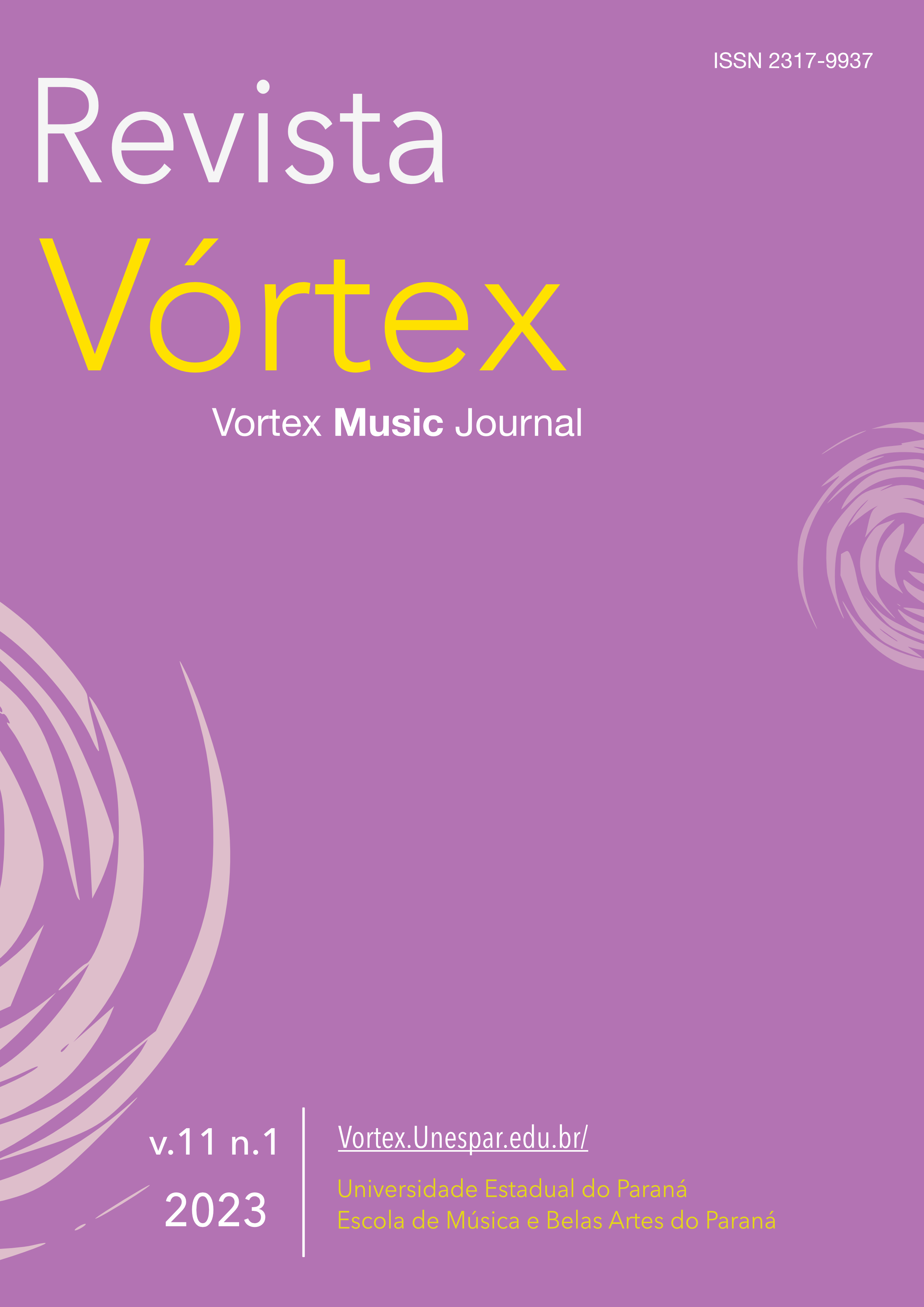Creative processes in musical composition: sources of inspiration under self-scrutiny
DOI:
https://doi.org/10.33871/23179937.2023.11.1.7444Keywords:
Creative processes, Self-investigation, Empirical study, Compositional ideas, Female composerAbstract
Self-studies on creative processes in musical composition are scarce. And so are studies on processes of female composers. Driven by these problems, I decided to investigate my own creative processes. I started with all those that occurred up to now, focusing the study on the inspirational sources of the processes. I sought to know not only what they inspired, but also how they appeared in the processes and my path, thus bridging literature gaps. Through a preliminary analysis of the data – which I collected by writing accounts based on the available sources of information – I developed a framework to analyse systematically my data, which may be used by other researchers in similar studies.
Downloads
References
ACADEMIA DAS CIÊNCIAS DE LISBOA. Inspiração. Dicionário da língua portuguesa contemporânea, Vol. 2. Lisboa: Verbo, 2001a, p. 2119–2120.
ACADEMIA DAS CIÊNCIAS DE LISBOA. Inspirar. Dicionário da língua portuguesa contemporânea, Vol. 2. Lisboa: Verbo, 2001b, p. 2120.
COLLINS, David. Real-time tracking of the creative music composition process. Digital Creativity, v.18, n.4, p. 239–256, 2007. DOI. 10.1080/14626260701743234
DONIN, Nicolas. Vers une musicologie des processus créateurs. Revue de Musicologie, v.98, n.1, p. 5–14, 2012. Disponível em <https://www.jstor.org/stable/24391941>. Acesso em: 22 jan. 2023.
DONIN, Nicolas. A autoanálise, uma alternativa à teorização? Trad. Michelle Agnes Magalhães. Opus, Porto Alegre, v.20, n.2, p. 149–200, 2015 (Obra original publicada em 2013). Disponível em <https://www.anppom.com.br/revista/index.php/opus/article/view/285>. Acesso em: 22 jan. 2023.
DONIN, Nicolas. Artistic research and the creative process: the joys and perils of self-analysis. In NIERHAUS, Gerhard (Org.). Patterns of intuition. Springer, 2015. p. 349–357. DOI. 10.1007/978-94-017-9561-6_16
DONIN, Nicolas. Empirical and historical musicologies of compositional processes: towards a cross-fertilisation. In COLLINS, Dave (Org.). The act of musical composition: studies in the creative process. Abingdon: Routledge, 2016 (Obra original publicada em 2012). p. 1–26. DOI. 10.4324/9781315612256
DONIN, Nicolas. Auto-analyse et composition musicale: une tradition méconnue, un enjeu actuel. In DONIN, Nicolas (Org.). Un siècle d’écrits réflexifs sur la composition musicale: anthologie d’auto-analyses, de Janáček à nos jours. Genève: Droz, 2019. p. 13–21. Disponível em <https://halshs.archives-ouvertes.fr/halshs-02480330>. Acesso em: 22 jan. 2023.
DONIN, Nicolas; FÉRON, François-Xavier. Tracking the composer’s cognition in the course of a creative process: Stefano Gervasoni and the beginning of Gramigna. Musicae Scientiae, v.16, n.3, p. 262–285, 2012. DOI. 10.1177/1029864912448328
DONIN, Nicolas; THEUREAU, Jacques. 2007. Theoretical and methodological issues related to long term creative cognition: the case of musical composition. Cognition Technology & Work, v.9, p. 233–251, 2007. DOI. 10.1007/S10111-007-0082-Z
DUARTE, António M.; KONSTANTINIDI, Niki P. Sources of Inspiration in Contemporary Vanguard Music Composers. Creativity Research Journal, 2022. DOI. 10.1080/10400419.2022.2077601
ELLIS, Carolyn; ADAMS, Tony; BOCHNER, Arthur P. Autoethnography: An Overview. Forum Qualitative Sozialforschung / Forum: Qualitative Social Research, v.12, n.1, art.10, 2010. DOI: 10.17169/fqs-12.1.1589
KATZ, Shira L. The influence of the extra-musical on the composing process. In COLLINS, Dave. The act of musical composition: studies in the creative process. Abingdon: Routledge, 2016 (Obra original publicada em 2012). p. 171–185. DOI. 10.4324/9781315612256
KATZ, Shira. L.; GARDNER, Howard. Musical materials or metaphorical models?: a psychological investigation of what inspires composers. In HARGREAVES, David; MIELL, Dorothy; MACDONALD, Raymond (Org.). Musical Imaginations: Multidisciplinary Perspectives on Creativity, Performance and Perception. Oxford: Oxford University Press, 2011. p. 107–123. DOI. 10.1093/Acprof:Oso/9780199568086.003.0007
NEWMAN, Timothy U. The creative process of music composition: a qualitative self-study. Tese (Doutorado, Música). New York University, 2008. Pro Quest.
POHJANNORO, Ulla. Inspiration and decision-making: a case study of a composer’s intuitive and reflective thought. Musicae Scientiae, v.18, n2, p. 207–234, 2014. DOI. 10.1177/1029864914520848
ROELS, Hans. The creative process in contemporary polyphonic music: a study and reflection on the main activities and processes in the act of composition. Tese (Doutorado, Música). Universiteit Ghent, 2014. handle: 1854/LU-5744222
SCHIAVIO, Andrea; MORAN, Nikki; VAN DER SCHYFF, Dylan; BIASUTTI, Michelle; PARNCUTT, Richard. Processes and experiences of creative cognition in seven Western classical composers. Musicae Scientiae, v. 26, n.2, p. 303–325, 2022. DOI. 10.1177/1029864920943931
TORRES, Rita. Fontes de inspiração em composição musical: 16 relatos retrospectivos. Zenodo, 2023. DOI. 10.5281/zenodo.7754383
ZEMBLYAS, Tasos; NIEDERAUER, Martin. Composing processes and artistic agency: tacit knowledge in composing. Abingdon: Routledge, 2018. DOI. 10.4324/9781315443928
Downloads
Published
How to Cite
Issue
Section
License
Copyright (c) 2023 Rita Torres

This work is licensed under a Creative Commons Attribution 4.0 International License.
Autores mantêm os direitos autorais e concedem à revista o direito de primeira publicação, com o trabalho simultaneamente licenciado sob a Licença Creative Commons Attribution que permite o compartilhamento do trabalho com reconhecimento da autoria e publicação inicial nesta revista.






